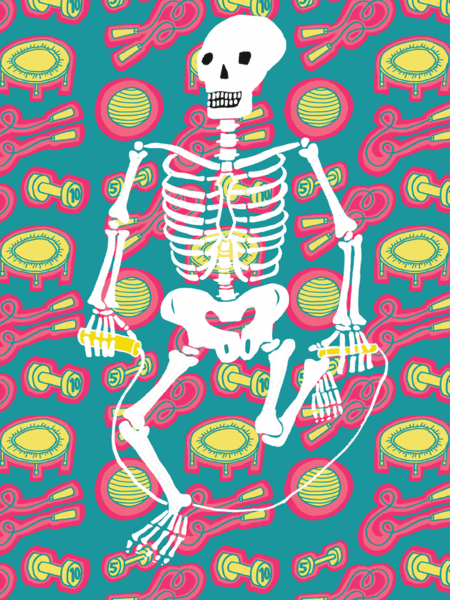Mainstream medicine and nutrition guidelines deliver these messages: Meet calcium intake recommendations when you’re young or your bones won’t develop well, and they’ll fracture when you’re old. To get enough calcium you’ll need dairy products or supplements. If you’re a postmenopausal woman, a bone scan will tell if you need medication, possibly for the rest of your life, to strengthen bones. But holistic health professionals question these dictums. Some of their concerns and recommendations are discussed here.
How Much Calcium?
Calcium’s level in the bloodstream is regulated by a complex interplay of organ systems and hormones. Parathyroid hormone (PTH) elevates calcium if it gets too low by enhancing absorption from food, minimizing loss in urine, and orchestrating release from bones. The hormone calcitonin opposes those same actions, working to lower blood calcium if it gets too high. Vitamin D, which is actually a hormone, works in concert with PTH. Maintenance levels of calcium in healthy people varies, as does urinary loss, suggesting that each person’s internal environment functions at a somewhat different set point—a concept called bioindividuality, as described in books such as Biochemical Individuality by Roger Williams and Nutrition Solution by Harold Kristal and James Haig.
The daily intake of calcium recommended by the Department of Agriculture and Department of Health and Human Services ranges from 500 to 1,500 milligrams, depending on age. Many people in other parts of the world with healthy bones and bodies have intakes below this, but in the western world we’ve grown up with the notion that we need calcium supplementation—whether in pill form, vitamin-enriched foods, or milk products. And while it may seem harmless to assert that everyone needs a lot of calcium, in excess it can accumulate in atherosclerotic plaques and kidney stones, and cause irregular heartbeat, confusion, and even death. Calcium supplements interfere with certain medications for heart disease, diabetes, and epilepsy, and hinder absorption of certain other essential minerals while causing bloating, gas, and constipation. Perhaps most importantly, the focus on calcium intake overshadows other essential bone-sustaining components and the importance of natural methods of bone health.
Dairy at Your Service
The dairy industry continues to have a powerful influence on national dietary guidelines. The National Dairy Council’s 3-a-Day Dairy program encourages consumers to have “a total of three servings of calcium-rich milk, cheese, or yogurt every day.” The program was developed in conjunction with the American Academy of Family Physicians, American Academy of Pediatrics, American Dietetic Association, and National Medical Association (the National Dairy Council gives presentations at the national meetings of these organizations). The program recommends flavored milk products to get children to meet the goal, and though a cup of chocolate milk has about 24 grams of sugar compared to 13 in unflavored milk, the council says its studies find that “kids who drink flavored milk, overall consume more milk and calcium without increasing sugars or total fat in their overall diet.” The council’s website advises people who are lactose intolerant (unable to digest milk’s predominant sugar, lactose) to choose hard cheeses or yogurt, whose natural lactose content is lower, or to eat specially created lactose-free products.
However, dairy products, especially pasteurized cow’s milk, evoke health problems in their own right. Dr. Frank Oski, pediatrician and author of Don’t Drink Your Milk, makes the case that cows’ milk is a poor food for humans, especially children, because of allergies, changes in intestinal bacteria, links with iron deficiency, and lactose intolerance. He reminds readers that about 70 to 90 percent of people of Asian, Arabian, or African descent are genetically lactose intolerant and so cannot digest milk well, while only 8 percent of American whites are intolerant. Other nutritionists concur: Milk isn’t for everybody.
Dylana Accolla is a practitioner of Chinese herbal medicine and a licensed acupuncturist in the Hudson Valley who counsels clients in nutrition. “For people who have dairy sensitivity or allergy, the milk they are consuming to help their bones is a problem,” she says. “I see it all the time. The Price-Pottenger Nutrition Foundation [a nonprofit that researches the scientific basis of ancestral wisdom on nutrition, agriculture, and health] recommends whole milk that is not pasteurized because that process denatures proteins and makes it somewhat indigestible, even for people who are okay with digesting the lactose.”
Accolla has a different suggestion altogether: “I recommend making a nutritious broth by picking up five pounds of bone from free-range, organically raised animals—never from industry-produced meat—and simmering it in water for four to six hours with a tablespoon of vinegar. The vinegar pulls calcium out of the bone, giving it more nutrition. It’s a good source of phosphorous and vitamin B12, which are also important to bone health. Then freeze it and have a little each day or use it to cook with.”

















